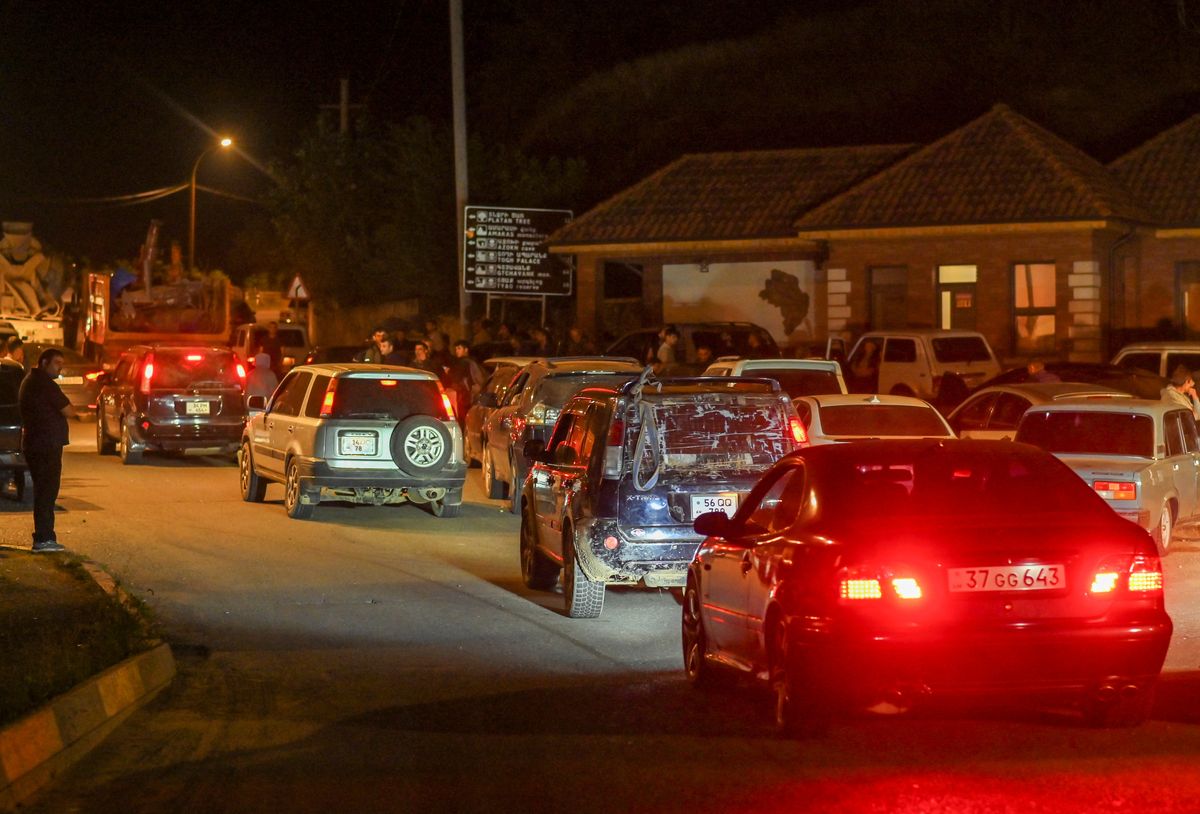Nagorno-Karabakh evacuations amid fears of ethnic cleansing
With Azerbaijan in the process of taking full control of Nagorno-Karabakh, the 120,000 ethnic Armenian residents are trying to evacuate.

A few minutes every morning is all you need.
Stay up to date on the world's Headlines and Human Stories. It's fun, it's factual, it's fluff-free.
The backstory: Armenia and Azerbaijan have a recent history of strained relations, dating back to the 90s when the Soviet Union fell. When the USSR was still around, the Nagorno-Karabakh region (previously claimed by both Armenia and Azerbaijan) was considered an autonomous area within Azerbaijan. After the USSR fell, ethnic Armenians there took over the territory in what’s known as the First Karabakh War, which led to the deaths of about 30,000 people and the displacement of a million.
There have been smaller conflicts between Armenia and Azerbaijan over Nagorno-Karabakh since then. In 2020, though, Azerbaijan took back the territory of Nagorno-Karabakh in the Second Karabakh War, with Russia brokering a peace deal that Armenia accuses it of not really holding up. This region is bordered by Armenia and run by ethnic-Armenian separatists.
More recently: For the past 10-ish months, Azerbaijan has had a blockade on the region, breaking up families and leading to food and supplies shortages. Last week, we briefly covered the short-lived conflict that took place in Nagorno-Karabakh over the course of about a day. The Azerbaijani military came in, demanding the Armenian separatist forces step back. They agreed to a ceasefire pretty quickly. But, Armenia reports that over 200 people were killed and 400 were wounded in the Azerbaijani military operation.
After taking control of Nagorno-Karabakh, Azerbaijan promised to fully recognize the rights, security and freedom of the ethnic Armenian population there. Azerbaijan plans to unify completely with the region. There have been rumors that the Azerbaijan government is building new prisons to lock up Armenians who got involved in the recent fighting and that lists are being made of people to arrest.
Azerbaijan says this rumor is “obviously ridiculous and unacceptable.” Azerbaijan said that most of the fighters are allowed to leave if they disarm but that some of them who “used inhuman treatment, elements of war crimes and crimes against humanity against civilians” would be brought to justice.
The development: With Azerbaijan in the process of taking full control of Nagorno-Karabakh, the 120,000 ethnic Armenian residents are trying to evacuate from the region, reportedly afraid of possible future ethnic cleansing as the area changes hands. Russia, the US and the EU – along with international experts – have also shown concern about the risk of ethnic cleansing in the region.
But, Azerbaijan agreed to open the Lachin corridor that links the territory to Armenia, and Armenia is welcoming in these refugees. All those who’ve become homeless from the military action in the area and want to leave for Armenia have been promised an escort by Russian peacekeepers. By Sunday night, Armenia said 1,050 people had already come in. Humanitarian aid is also being delivered to Nagorno-Karabakh.
Key comments:
"Our people do not want to live as part of Azerbaijan. Ninety-nine point nine percent prefer to leave our historic lands," David Babayan, an adviser to the Armenian leader of Nagorno-Karabakh, told Reuters. "The fate of our poor people will go down in history as a disgrace and a shame for the Armenian people and for the whole civilized world. Those responsible for our fate will one day have to answer before God for their sins."
"If proper conditions are not created for the Armenians of Nagorno-Karabakh to live in their homes and there are no effective protection mechanisms against ethnic cleansing, the likelihood is rising that the Armenians of Nagorno-Karabakh will see exile from their homeland as the only way to save their lives and identity," Armenian Prime Minister Nikol Pashinyan said in an official address to the country.
“If someone decided to go to Armenia, I think they can do it,” said Azerbaijani international affairs official Hikmet Hajiyev, denying that Azerbaijan isn’t allowing them to leave.
"We have never wanted ethnic cleansing," said Zaur Ahmadov, Azerbaijan's ambassador to Sweden. "Full normalization will require some time. But trucks full of food have already been transported to Khankendi; there will be fuel supplies and restoration of infrastructure such as kindergartens in the coming days."




Comments ()